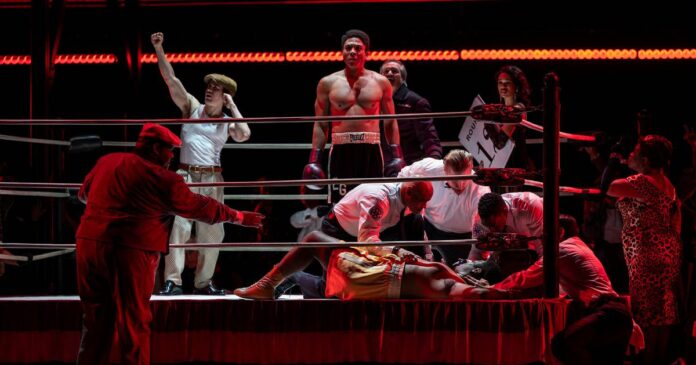Three different singers play the welterweight boxer Emile Griffith in Lyric Opera’s visceral production of Terence Blanchard’s 2013 jazz opera “Champion.” That’s not uncommon in biographical stories, especially one that explores a tragic figure from his impressionable youth to the section of life where triumph and disaster present themselves, to the restlessness of a demented old age spent in search of both cohesion and absolution.
But the most remarkable thing, and the rarest in my experience, about director James Robinson’s deeply moving and richly sung staging of a gorgeous jazz opera is how palpably the trio are in emotional sync. Naya Rosalia James, who plays Little Emile, hands the gloves to Young Emile’s Justin Austin, who strings them up for baritone Reginald Smith Jr., and yet you’d swear you feel the musical arc and psychological trajectory of just one man.
The result of that cohesion, for which conductor Enrique Mazzola and the set designer Allen Moyer also deserves credit, is an uncommonly intense experience at the opera house. I walked out marveling, once again, at the arbitrary nature of professional acclaim or disdain, how much the era of your birth can impact your happiness, how most all of us feel guilt but only some allow it to debilitate, how a singular random event can torpedo your life. When I’d got through all that, somewhere in the rain on Wacker Drive, I started anew on forgiveness and my own capacity for it, or maybe my lack thereof. And where it may be owed me. Such is the force of Blanchard’s music, Michael Cristofer’s libretto and Griffith’s real-life story.
Chicago theatergoers have encountered Emile Griffith before. In 2016, Court Theatre premiered “Man in the Ring,” Cristofer’s play about what happened at Madison Square Garden in 1962 when Griffith, a champion boxer from the U.S. Virgin Islands, fought the 25-year-old Cuban boxer Benny “The Kid” Paret. As the Tribune reported from the ringside in explicit detail at the time, Griffith threw 29 consecutive punches at Paret within just a few seconds in the 12th round. Paret was knocked through the ropes, fell into a coma, never regained consciousness and died 10 days later of brain hemorrhaging.
In the play version, the focus landed on Paret’s pre-match taunting of Griffith, who described himself as bisexual. The blows thus flowed from the boxer’s pent-up fury, a consequence of being abandoned by his mother and taunted by Paret (sung in the opera Saturday night by the impressive Sankara Harouna). But even though the libretto is by the same man, Cristofer, the punches of the opera land entirely differently and more in tune with the notion of tragedy as occurring when the hero is engulfed by sudden chaos.
Paret’s death feels both random and inevitable (given, well, boxing) and Blanchard’s music is informed partly by the syncopated soundscape of the early 1960s but mostly by what transpires inside Griffith’s own head.
Smith, who plays the old Griffith fighting now for his own sanity, is unspeakably moving: I watched him watch Mazzola, almost taking cues as if from a caregiver and then roaring with pain, all of which are foreshadowed beautifully by James and Austin. The supporting cast is every bit as strong. As Luis Rodrigo Griffith, the elder Griffith’s companion and adopted son, the rising star Martin Luther Clark embodies empathic compassion but also jolts the audience with how the beauty of his voice co-exists with the mundanity of the situation. As Mercedes “Sadie” Donastorg Griffith, who was married to the boxer in 1971, Meroë Khalia Adeeb explores the intersection of love and denial, and as Emile’s mother Emelda, the soprano Whitney Morrison finds her way in the second act, as her character’s prior decisions blow up in her face.
“The Champion” originated at the Opera Theatre of St. Louis in 2013 but is now a co-production with New York’s Metropolitan Opera, which staged Robinson’s version last spring. I’d argue that there is a section of Act 2 that doesn’t entirely work: Griffith’s transition from spiraling fighter to dementia sufferer is too abrupt to make sense, reliant as it is on one quick scene with his professional handler, Howie Albert (the fine tenor Paul Groves). But that’s a minor issue, given the richness of this expressionistic production, the cohesion of which flows from how well Moyer, lighting designer Donald Holder and costumer Montana Levi Blanco connect Griffith’s pain into their visual environments.
If you saw “Fire Shut Up in My Bones,” you’ll recognize motifs and themes: especially the alienation of the individual and the staying power of childhood trauma and abuse. That superb later Blanchard opera is a leaner and more esoteric piece. Now given a top-drawer staging, “Champion” takes on sport, the media, fame, sexuality, migration, poverty and trauma. And yet the strings are lush and cinematic, the voices soar with aspiration and hope and an old fighter never leaves the ring even as he keeps looking for his shoes.

Theater Loop
Weekly
Get the latest news and reviews from America’s hottest theater city, delivered to your mailbox weekly.
Chris Jones is a Tribune critic.
Review: “Champion” (4 stars)
When: Through Feb. 11
Where: Lyric Opera House, 20 N. Wacker Drive
Running time: 2 hours, 45 minutes
Tickets: $49-$339 at 312-827-5600 and www.lyricopera.org



